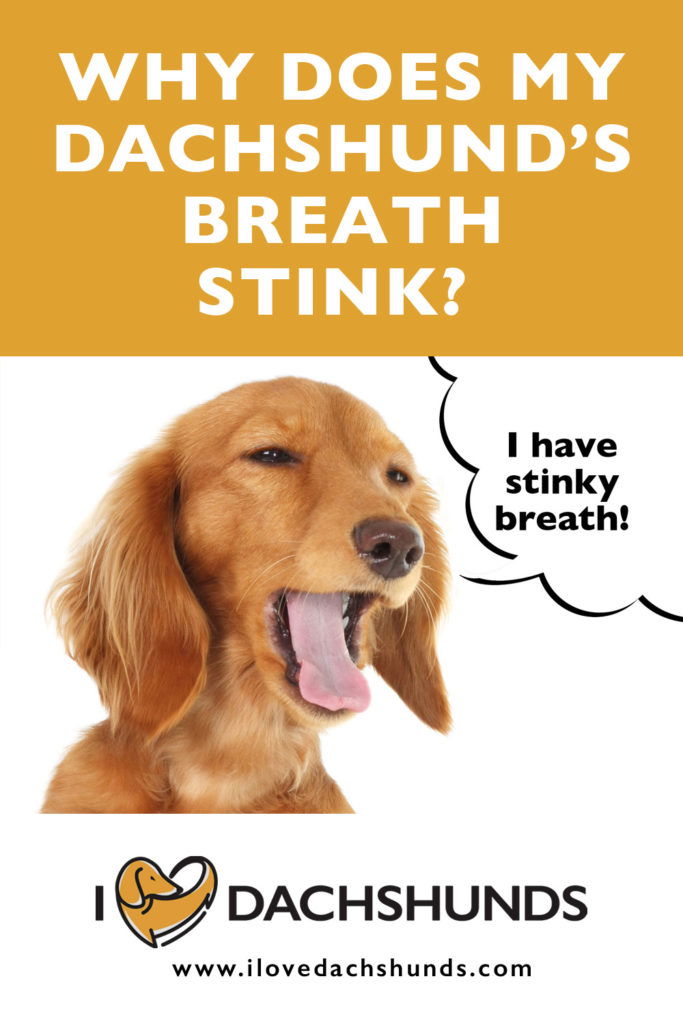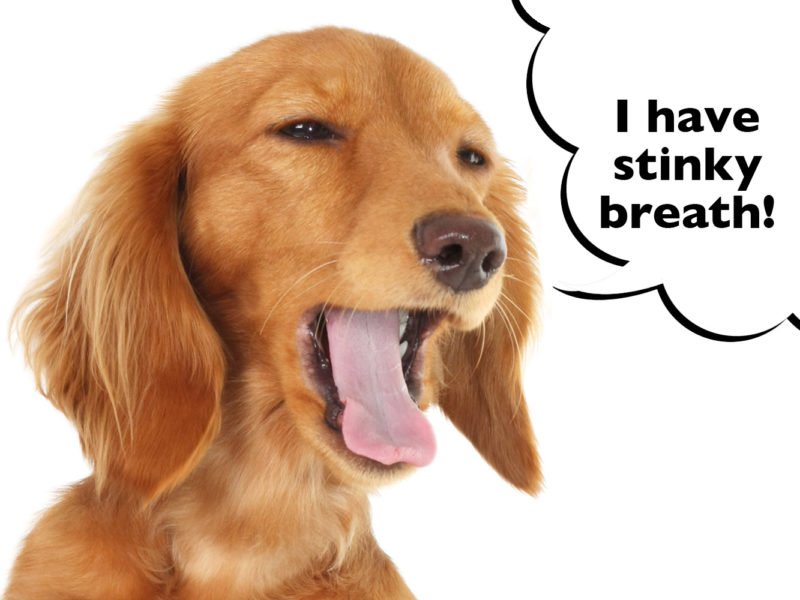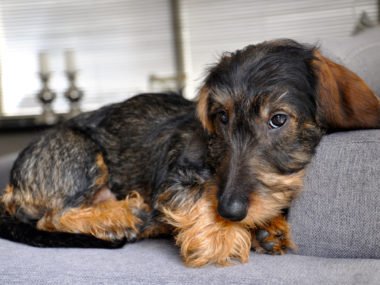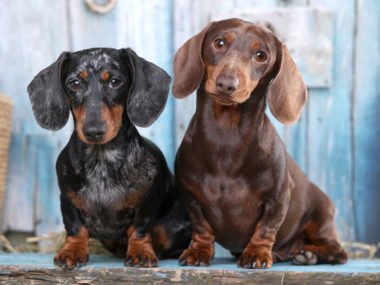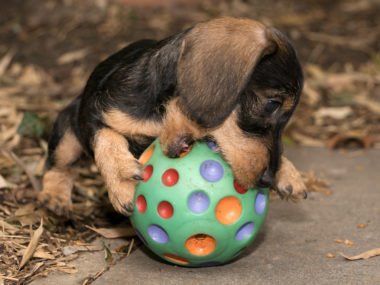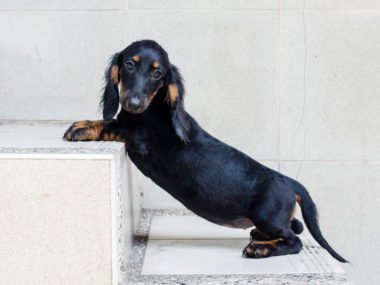Does your dachshund’s breath smell really bad? Are you wondering what’s causing the stinky stench and what you can do about it? Here’s everything you need to know about dachshunds and bad breath.
Why Does My Dachshund’s Breath Stink? A dachshund’s breath smells bad due to a build up of plaque and tartar, an increase in bacteria, food stuck in-between his teeth, and from eating poo and other gross things outside. It could also be a sign of a more serious health problem like diabetes or kidney failure.
But, before you grab the doggy toothbrush, there’s more you need to know! Read on to find out why dachshunds have such bad breath and what you can do to help fix the problem.
Table of Contents
- Why Do Dachshunds Have Bad Breath
- Is Bad Breath A Sign Of Health Problems In Dachshunds?
- How Do I Fix My Dachshund’s Bad Breath?
- How To Brush A Dachshund’s Teeth
- Should I Get My Dachshund’s Teeth Professionally Cleaned?
- How Much Does It Cost To Get A Dachshund’s Teeth Professionally Cleaned?
- Does Pet Insurance Cover Teeth Cleaning For My Dachshund?
- What do I do next?
This article is based on research and personal experience as a Dachshund owner of 10+ years. I’m not a Vet, qualified dog trainer or dog behaviourist.
Why Do Dachshunds Have Bad Breath
The main causes of bad breath in dachshunds are:
Bad Dental Hygiene
If you don’t do anything to keep your dachshund’s teeth and gums healthy, he’ll likely end up with bad breath. Dental hygiene is an extension of grooming and should be worked on regularly.
Tartar
Dachshunds can suffer quite badly from halitosis. They’re more prone to a build-up of tartar and gum diseases than some other dog breeds.
Bacteria
Tartar is bad enough, but when it begins to cover the teeth, pockets of bacteria start to form under the gums. This then causes damage to the ligaments that hold the teeth in place.
Bacteria can also enter the bloodstream and travel to the heart, lungs, liver, spleen, and kidney, and that can cause all kinds of problems for your dachshund.
So, not only will a healthy mouth cut down on smelly breath, but it may well add years of life expectancy!
Crowded teeth
Another reason why dachshunds have more dental problems than other breeds is their tiny mouths are very crowded from fitting in the 42 adult teeth.
When you look at the size of their teeth, you’ll see they’re actually pretty big in comparison to their body size. That means there are more crevices in which tartar can build up and infect teeth and gums.
Baby Teeth
Sometimes dachshund puppies get baby teeth that don’t fall out as they should. This causes the adult tooth to grow beside the baby tooth and food gets trapped in-between.
If the second tooth isn’t spotted right away, it could cause your dachshund’s breath to smell bad. That’s why regular vet checks are so important to check for these sorts of things. And of course, any baby teeth that don’t fall out on their own will need to be removed at the vets.
Coprophagia
One final cause of foul smelling breath can come from your dachshund eating things he really shouldn’t! The habit of coprophagia basically means he’s eating poop. This might be his own or poo from other dogs or animals.
Now, this is sometimes a behavioural issue that may need professional help to identify why it’s happening. Do be aware, though, it could also be caused by several different medical conditions, so a quick trip to the vet needs to be first on the plan of action.
Is Bad Breath A Sign Of Health Problems In Dachshunds?
Bad breath can sometimes be a sign of underlying health problems in dachshunds. Both diabetes and kidney failure can cause your dachshund’s breath to smell very different to normal.
Diabetes can cause a dachshund’s breath to smell sweet due to excess sugar in the bloodstream, a sour aroma due to increased bacterial growth, and a musty smell due to yeasts growing in the mouth.
In kidney failure, a dachshund’s breath may smell metallic. That’s because the kidneys are struggling to filter waste products resulting in a build-up of toxins.
How Do I Fix My Dachshund’s Bad Breath?
This is how to fix a dachshund’s bad breath:
Visit the vet
First things first, book to see your vet. This is especially important if the onset of smelly breath was sudden. Get them to check your dachshund’s teeth and gums, and rule out any serious health problems.
Once your vet has given you the all clear, you can then think about what you can do to make everything smell a little sweeter.
Brush Teeth
The best way to reduce plaque and get rid of bacteria build-up is to brush your dachshund’s teeth. After all, that’s what we humans do to keep our teeth sparkling clean!
Ideally, this should be done at least three times a week using a canine toothpaste that’s specially designed for dogs. Don’t ever be tempted to use any of your own toothpaste, as fluoride can be poisonous to dogs.
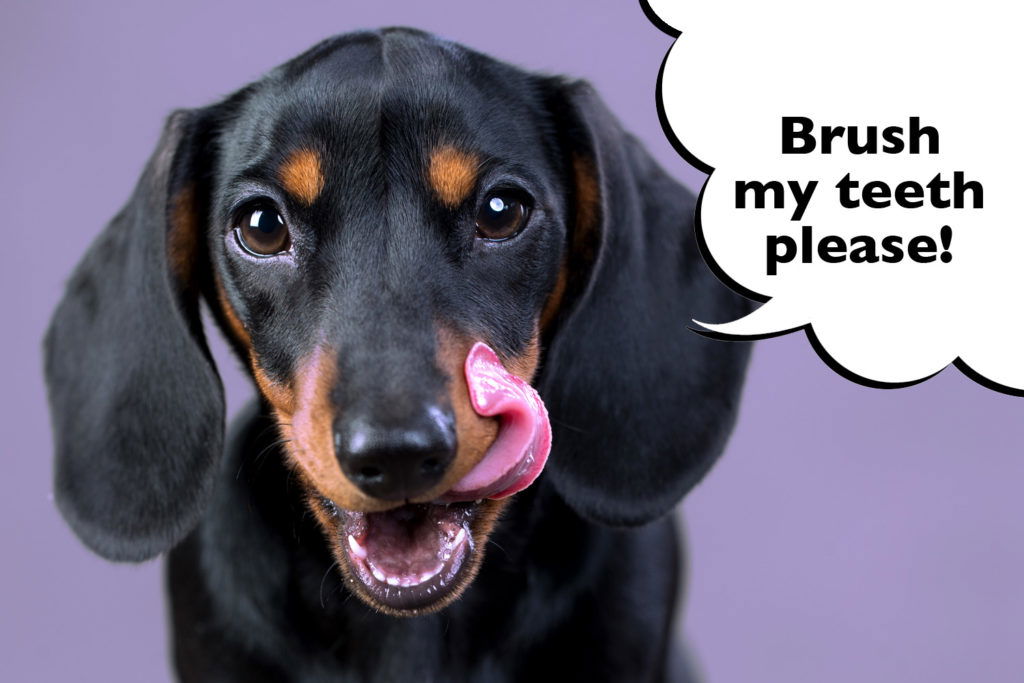
Dental Wipes
If your dachshund hates the idea of a toothbrush, you might find he’s happier with a doggy dental wipe instead. Tooth wipes are designed to be rubbed against your dachshund’s teeth. They work in the same way as a toothbrush to remove the surface plaque.
Do be aware though, wipes won’t get into all the nooks and crannies of teeth in the same way a brush would. But they will help as part of your dachshund’s dental hygiene routine.
Dental Chews
There’s a whole range of dog treats that are designed to keep teeth and gums healthy. The thinking behind these is that when your dachshund is chewing something, it reduces the build-up of plaque.
Do check out the ingredients in these chews though, as they can be full of sugar along with all kinds of additives and low-quality ingredients.
Natural chews may be a better option and they often last longer, but even these can be high in fat. Dachshunds are prone to obesity, so make sure you watch your dachshund’s daily calorie intake to avoid any weight issues.
Healthy Diet
A nutritious diet is an absolute must for keeping your dachshund in good oral health. Swap out fatty shop bought treats for fresh crunchy veggies like carrot and cucumber.
There are also several dry dog food ranges from RoyalCanin and Hillspet designed to remove plaque through their shape, size, and composition.
Again, check out the quality of the food first, make sure there’s a named source of protein and no unnecessary additives and colourings.
Raw Food
Owners who feed their dachshunds a raw diet, often find their dogs have fewer problems with the build-up of plaque. That’s because their dachshunds spend time gnawing on raw meaty bones!
For safety, don’t ever give your dachshund raw food without speaking to your vet and learning about it first.
Chew Toys
For an option that’s not going to cause any weight problems, chew toys made from rubber or nylon can be a great choice to help reduce the buildup of plaque.
Don’t give you dachshund any toys that are too hard or rigid though. Anything that could crack a tooth or cause gums to bleed should be taken away.
Water Additives
Some people put additives in their dachshund’s water bowl to get rid of plaque build up. ‘Fresh Dental’ is a popular choice. Water additives basically help clean your dachshund’s teeth and freshen his breath without brushing.
That doesn’t mean you shouldn’t brush his teeth though. Nothing is going to beat regular tooth brushing. This is just something to use in addition, or if you have a dachshund that literally refuses to let you near his teeth.
Supplements
Seaweed is a natural way to improve your dachshund’s dental hygiene. The alga Ascophyllum nodosum is a brown seaweed that’s found along the shorelines in Northern Canada, the United States, and Europe. It’s been shown to reduce both plaque and bleeding of the gums.
You’ll find several different products that contain the alga, that have been designed to help with your dachshund’s bad breath, plaque and tartar. One example is ProDen PlaqueOff, but you can also get powders to sprinkle in their water, supplements to add to their food and chew sticks.
Obviously, before you give your dachshund any new supplements, it’s best to check with your vet to make sure it’s safe.
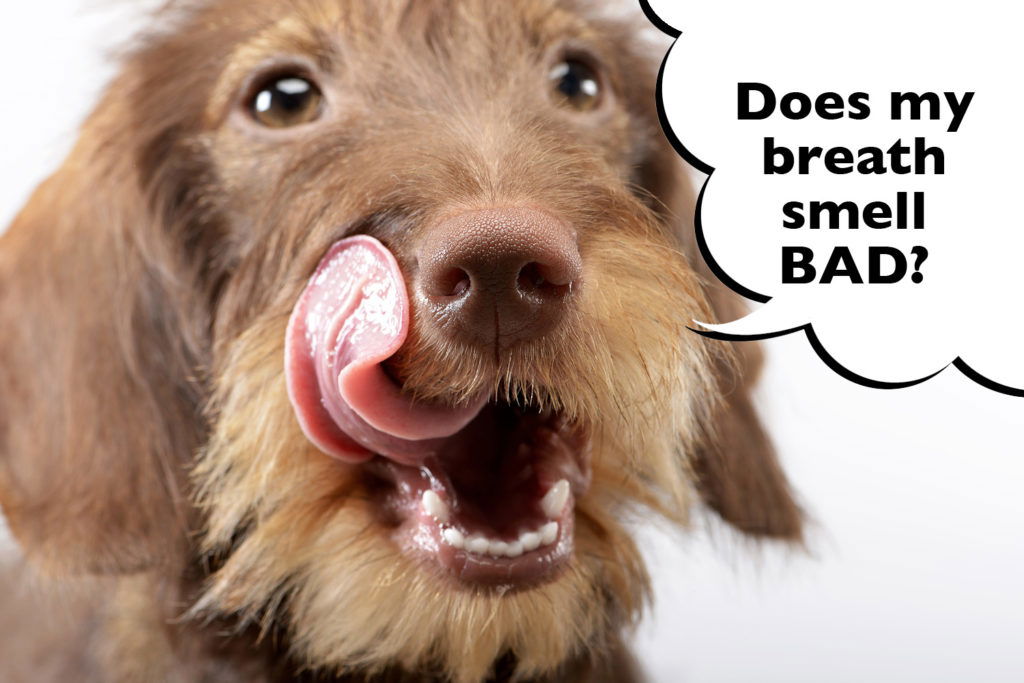
How To Brush A Dachshund’s Teeth
For most dachshunds, it takes a little while to get used to the sensation of having their teeth brushed. So, take it slowly and pick a time of day when your dachshund is chilled out and more likely to accept handling. Maybe after a walk or at the end of the day when he’s less energetic.
Using a doggy toothbrush can make the job of brushing easier as they tend to be angled to cope with the shape of your dachshund’s teeth. You could also use a baby toothbrush to start with and see how you get on.
Put doggy toothpaste on your finger
Start by placing a tiny amount of doggy toothpaste on the tip of your finger and then just lift your dachshund’s lip. This gets him used to the idea of being touched around his mouth. He should also enjoy licking the doggy toothpaste off your finger!
Rub your dachshund’s gums with toothpaste
Gently rub your dachshund’s gums with your finger, again with doggy toothpaste on it. Take it nice and slowly and keep watching his body language so you know how he’s feeling.
Encourage your dachshund to lick the toothbrush
Once your dachshund is happy, move on to using a brush. Let him see the toothbrush and then allow him to lick some toothpaste from the bristles.
Use your fingers and also the toothbrush
Next rub your dachshund’s gums with your finger again. Every now and then, gently brush a tooth for just a few seconds.
Start brushing your dachshund’s teeth
Slowly build up the time until you’re just using the brush, and all your dachshund’s teeth are being cleaned.
Keep toothbrushing session short
Don’t forget to keep the sessions short, to begin with. You’re probably not going to get all your dachshund’s teeth brushed and cleaned on your first attempt.
Book your dachshund a vet check
For dachshunds that have teeth covered in plaque, you may find it easier to have your vet do the first clean. This’ll give you a clean slate to begin with so you can keep on top of his dental hygiene.
Should I Get My Dachshund’s Teeth Professionally Cleaned?
As dachshund age, it’s a good idea to get their teeth cleaned at the vets at least once a year. Take him for regular dental checkups too, so they can spot any signs of tartar build up, loose teeth, infected teeth and gums.
The more time you put into your dachshund’s dental hygiene from an early age, the better. If he needs dental work or professional cleaning, it can be very expensive. He may also need to be anaesthetised, so bear that in mind.
How Much Does It Cost To Get A Dachshund’s Teeth Professionally Cleaned?
As a guide, the cost of getting your dachshund’s teeth professionally cleaned and descaled will be around £230-£450 or $300-$600. This price generally doesn’t include any tooth extractions that may be needed, those are normally charged separately.
Prices will of course vary depending on your individual vet, the weight and age of your dachshund, what dental work needs doing, and the location where you live.
If your dachshund is a senior, cleaning is likely to cost more. He’ll need additional blood work to be sure he’s safe to have the procedure and may need additional extractions too.
Professional teeth cleaning is expensive and that’s why brushing your dachshund’s teeth from a young age is SO important. You just want to do all your can to keep his teeth and gums in good shape.
In some states in the US, professional teeth cleaning can be as high as $800-$1000! And that’s why prevention is always better than cure!
Does Pet Insurance Cover Teeth Cleaning For My Dachshund?
Most pet insurance companies don’t cover dental cleaning or routine dental treatments. Although, some do offer monthly ‘wellness plans’ that you add-on to your policy that may cover teeth cleaning once or twice a year.
Insurers do sometimes cover dental work if your dachshund’s teeth were damaged in an accident, but you’d have to check your individual pet insurance policy for details.
So, there you have it. Dachshunds can have foul smelling breath, but there’s normally a reason why. Dental issues are the most common culprit, so take him for a vet checkup and get on top of his oral hygiene right away, to make all his kisses smell sweet again!
What do I do next?
If you read all the way to the end of this article, you’re exactly the sort of person I’d LOVE to join my Facebook Group. Your support for my blog means everything to me so, if you found this article helpful, please kindly share below. Thank you! 💋
